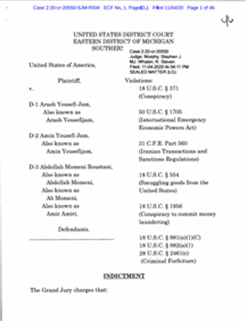Three Iranians Charged with Illegally Exporting Electronic Goods to Iran
Anne-Liese Heinichen
ERAI, Inc.
On January 12, 2021, an indictment was unsealed in the US District Court, Eastern District of Michigan charging Arash Yousefi Jam aka Arash Yousefijam; Amin Yousefi Jam aka Amin Yousefijam; and Abdollah Momeni Roustani aka Abdollah Momeni, Ab Momeni and Amir Amiri with conspiracy to export US-manufactured product to Iran in violation of the International Emergency Economic Powers Act (IEEPA) and the Iranian Transactions and Sanctions Regulations (ITSR), conspiracy to smuggle goods from the US, and conspiracy to commit money laundering.
The US Government alleges that starting in January 2015 through February 2017, Arash Jam, Amin Jam and Abdollah Momeni caused goods to be exported from the United States to Iran without having obtained required licenses and in violation of the Iran sanctions. The trio placed orders with US companies and had the product shipped to the United Arab Emirates which was then subsequently forwarded to Iran. The defendants used third parties for payments and transportation services and intentionally concealed the ultimate destination of the parts they sought to procure which included nine electrical discharge boards, a CPU board, two servo motors, and two railroad crankshafts.
According to the indictment, Arash Jam emailed a US supplier requesting prices for the electrical discharge boards stating he was in Canada, but the boards were being sent to the United Arab Emirates. The boards were for an EDM machine, located in Iran, that was originally manufactured by a company in Spain. He also subsequently sent a request for quote to a supplier in the United Kingdom who replied asking for the serial number of the EDM machine for which the parts were being procured. Arash Jam provided the serial number, but the UK supplier refused to provide a quote as, “…the machine is in a prohibited Country. Therefore we will not send a quotation to you.” An order was placed with the US supplier, a subsidiary of the Spanish manufacturing company, and payment was made from a bank account located in the United Arab Emirates at Momeni’s apparent direction. When questioned by the US supplier about the serial number of the machine for which the parts were to be used, Arash Jam found another machine for sale and provided the US supplier with the serial number from that machine, as he had been previously denied a sale by the British supplier when he provided the EDM machine’s actual serial number. The US supplier consulted with the manufacturer, the Spanish-based company, who became suspicious as the same serial number had been provided for a different order, and refused the sale citing concerns the parts were going to Iran. Regardless, the US supplier agreed to the sale. Arash Jam agreed to have a shipping company pick up the parts in the US per the US supplier’s insistence.
The defendants then placed a subsequent order with the same US supplier for a CPU board for the same machine. Momeni provided Arash Jam with a wire payment confirmation from a bank in the UAE. The part was shipped from the US to the UAE, ultimately destined for Iran. When the CPU failed to function properly, the US supplier informed them the EDM machine with that serial number was located in Romania and that, if the CPU board they purchased was for a different machine, it would not function properly.
When attempting to purchase two servo motors, Amin Jam once again ran into difficulties with shipping companies who refused to ship the motors to Iran without OFAC licenses. Amin Jam responded that they could not arrange for a license and asked for a way to ship the product without a license but the company refused. Amin Jam then sought quotes from Iranian shipping companies, one of which arranged to have a US shipping company pick up the goods in the US and transport them to the UAE. Once in the UAE, Amin Jam directed the Iranian shipping company to send the shipment to Bandar Abbas in Iran.
In July of 2016, Arash Jam sought to procure railroad parts from a Croatian supplier and a French supplier at the bequest of the “ministry of transportation in Iraq”. The French supplier denied their request for quote as they were “in direct contact with the Iraq Railways and IRR [has] told us that this requirement is not for them.” Over the course of several months, Arash Jam emailed various companies around the world, even in some cases admitting the parts were destined for Iran, to no avail without applying for a sanctions export permit. In late October, a US supplier agreed to sell two railroad crankshafts destined for Iraq to Arash Jam, acting as the Managing Director of Austin General Trading. Payment was wired from a bank in Hong Kong and a bank in Turkey, over paying by $6,000 and asking the US supplier to mail a check to Arash Jam in Canada for the overpayment. He then arranged for a shipper to send the parts to UAE and “cross-stuff” the goods for forwarding to Iran. The shipping company asked for the consignee’s details in Iran and sent the shipment in April 2017 to the Zarin Kosar Shaya Company in Tehran.
Arash Jam was arrested in North Carolina on December 23, 2020 but requested and was granted extradition to a facility in the Eastern District of Michigan. A bond hearing has not yet gone before the court; however, Mr. Jam’s lawyers argue that the naturalized Canadian citizen is not a flight risk, “because of his opposition to the political regime in Iran…and has neither the legal ability, nor the desire to return to Iran, especially given the ‘warm’ reception he would be sure to receive as an opponent of the government.” Amin Jam, according to Canadian press reports, was arrested in Canada and was scheduled to appear before a Canadian court for extradition proceedings. Abdollah Momeni is an Iranian citizen believed to be living in Iran.
If convicted of the charges, each defendant faces a maximum penalty of 5 years’ imprisonment and a $250,000 fine for the export and smuggling charges and 20 years’ imprisonment and a $500,000 fine for money laundering.
"Since 1979, in order to protect the freedom and security of the American people, the United States has made it illegal to export goods to Iran. The deeply disturbing allegations in this case are that the defendants conspired to export highly sophisticated American manufacturing equipment and other American-made items into the arms of the Iranians. We will follow every single lead in this case as we pursue justice against the defendants, and we will continue to help American businesses protect themselves from criminal schemes like this.”
--U.S. Attorney Matthew Schneider for the Eastern District of Michigan
Further Reading:
https://www.justice.gov/opa/pr/three-charged-illegally-exporting-goods-iran
SEE MORE BLOG ENTRIES
|

Arash Yousefi Jam (Source: Mecklenburg Public Records)

Indictment
|